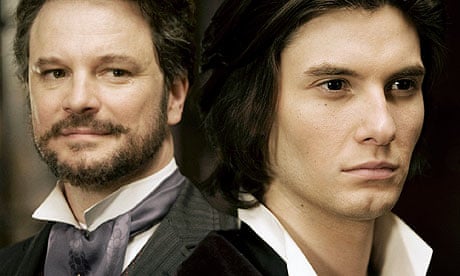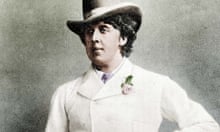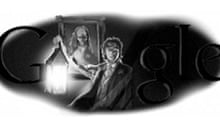Though a product of the Victorian age, Oscar Wilde and his works always seemed thoroughly modern. I don't only mean that readers today easily relate to Wildean concepts; the universal will always be universal, and Shakespeare is as relevant as ever.
Rather, Oscar's sensibilities are so perfectly fitted to our time: sarcastic, idealistic, playful, gloomy, melodramatic, conflicted. He was a self-created superstar, with a weirdly modern awareness of all that entailed: manipulation of image, distancing humour and irony, persona as artistic statement.
And all those knowingly self-contradictory epigrams, simultaneously flippant and deathly serious, almost like Zen koans: coming at eternal truth by a sort of profound, solemn mischievousness.
I've always adored Oscar Wilde: the effervescent dramas and witty essays, and the construct that was Oscar, glamorous, riotous, effortlessly brilliant. But in an odd, paradoxical – you might almost say Wildean – way, my favourite of his works is The Picture of Dorian Gray, subject of Dublin's One City, One Book initiative for the last month.
Readings, exhibitions, walks and various other events have been marking the only novel Wilde published. And with a nice touch of synchronicity, I'd only recently reread the story, in a beautiful hardback collection of all Oscar's work, complete with Aubrey Beardsley's wonderfully stark illustrations, old playbills and so on.
Its story of Dorian Gray – a young man beautiful of face and spirit, seduced into dissolution and degradation by the impish hedonist Lord Henry "Harry" Wotton – is an unflinching meditation on moral corruption, the nature of the soul, heaven and hell.
In the opening scene we are introduced to the titular picture, painted by the deeply moral Basil Hallward. There's an air of foreboding from the beginning, as Basil declares he will never exhibit it, saying: "There is too much of myself in the thing … I am afraid that I have shown with it the secret of my own soul."
With Harry's Mephistophelean whispers in his ears, Dorian eventually eschews moral sobriety to wallow in indulgences of the flesh. Under the censorious strictures of the period none of this is spelled out explicitly, which makes it more powerful: the reader's mind imagines the worst of all scenarios.
Dorian's narcissism had already guaranteed his fall: he ushers up an unholy prayer that the portrait should age and bear the scars of his moral turpitude, while his physical self would forever look young and innocent. After he cruelly provokes the suicide of the sweet-natured Sybil, Dorian is fully lost but shows none of it on his angelic face; the picture, meanwhile, ages and degrades and grows rotten in the attic.
For me, Dorian Gray is special – not necessarily Wilde's best work but unique in his canon – because it's so sincere: ineffably, inescapably, absolutely. It's a very good novel anyway: moving, exciting, full of dread, angst, horror, lucidity… and a great love, I think, for mankind and for the artist's own self.
But above and underneath and beyond all this, he is sincere when he writes it. Not the normal Wildean sincere-in-his-insincerity (though Harry delivers a whirlwind of tremendous comic riffs), but old-fashioned, straight-up sincere.
No arch one-liners to deflect attention, no glib protestations that it was all just a joke, not to be taken seriously. This is authentic, almost painfully so; this is Oscar laid bare.
Elsewhere in his work we see mostly Public Oscar on display. Private Oscar was mostly kept concealed behind the dazzling wit. He can be found in a few other places: later works like De Profundis, some of the poetry and, in a strange way, the children's stories. But nowhere, for me, is the real Oscar revealed so much as through his alter-ego here, or rather his dual alter-egos: the beautiful, ruined Dorian and the cynical but empathetic Harry.
The One City, One Book website chooses a most appropriate quote: "The whole book seemed to him to contain the story of his own life, written before he had lived it."
And Dorian Gray is replete with similar lines, from various characters: "…seeing in that great work of art a presentation of the tragedy of his own soul." "I will show you my soul. You shall see the thing that you fancy only God can see." "It is the face of my soul."
In the text they're talking about Basil's portrait, or other works of art; in the broader narrative of the author's life, he is talking about the essence of Oscar Wilde. He's writing the book of himself in words and actions.
It's art imitating life imitating art, to infinity. It's pure Oscar. It's the real Oscar.



Comments (…)
Sign in or create your Guardian account to join the discussion